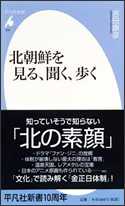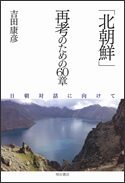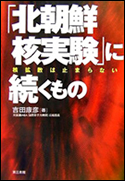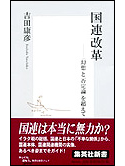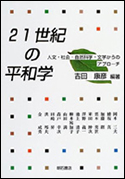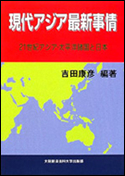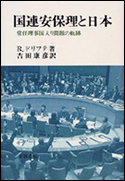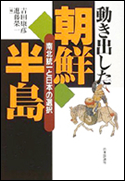2004年5月01日
【4】Contribution of the Chosen-Soren to Japan's Society (May 2004)
Formation of two rival bodies; the Chosen Soren and Mindan
The existence of two divided states in the Korean Peninsula brought about the formation of two rival bodies of the Koreans living in Japan; the Chosen Soren and Mindan. (Chosen is another appellation of “Korea” in ancient Korean. Soren means a general association, while Mindan is a people’s organization.)
Immediately after having been liberated from the yoke of Japan’s colonization in 1945, they created a national unified body to defend their common interests, but split into two soon afterward. .The Chosen Soren is a communist-affiliated association of pro-Pyongyang Korean residents, who are now in the relatively small minority out of some 630,000 Koreans living in this country. Its exact membership is kept confidential, but estimated to be around 150,000, less than one-fourth of total number at present.
The defeat of imperialist Japan marked the end of its 35-year-long colonial rule of Korea. At the time of the end of the Second World War in August 1945, more than 2,300,000 Koreans had been registered as permanent residents in Japan. Two-thirds of them returned home in liberation and jubilation. Many of them had been brought forcibly from Korea as a working force for Japan in its desperate fight against the United Statesand the other Allied Forces..
Commitment by the Allied Powers to a free, independent and unified Korea failed to be fulfilled, with the emergence of the US-Soviet Cold War structure. Two rival states were born in the Korean Peninsula in 1948, the Soviet-led socialist regime led by Kim Il-sung in the north, and the American-influenced capitalist government headed by Lee Sung-man in the south respectively. The Koreans in Japan had hence to belong to either of the two rival organizations, one with the pro-Pyongyang Chosen Soren and the other with the pro-Seoul anti-communist Mindan.
The Korean War(1950-53), ―North-South military confrontation, ended in a permanent division of the Peninsula. It sharpened their rivalry in Japan, making the Soren , an overseas political tool of the socialist regime. Established in 1955 as in its present form, the Soren thus became a highly political organ, far more radical, nationalistic and revolutionary than its rival Mindan, in its platform and daily activities.
Under a bilateral agreement signed by the Japanese and DPRK Red Cross Societies in 1959, a total of 93,340 Korean residents returned to the north by 1980, encouraged by North Korea’s leader Kim Il-sung to come back home, working for the construction of a paradise in their homeland, rather than suffering from discrimination in Japanese society. The Soren made a big propaganda to promote their return home. However, Kim’s attractive words proved to be a complete deception and disillusion. Most of them had to lead a miserable life in the north, where they found themselves in extreme poverty and equally discriminatory treatment as outsiders in their indigenous Korean community.
In recent years, there have been thousands of refugees fleeing from North Korea for survival across the Sino-Korean border. They include many former residents in Japan, who confess they had suffered from dire poverty and predicament. An estimated total of 1,800 Japanese women married to Korean men followed their husbands to the north during the return-home campaign, and in most cases, their whereabouts remain unknown. There are also a number of NGOs with different objectives to rescue those refugees and eventually to topple the Kim Jong-il regime.
Japan recognizes only South Korea
Japan, in 1965, normalized diplomatic relations only with South Korea, which the Japanese government recognized as the sole legitimate regime in the Korean Peninsula Since then, Japan and South Korea have maintained relatively stable relations with each other, with pro-Seoul Korean residents in Japan, enjoying freedom of travel, marriage and naturalization.
On the other hand, the Chosen Soren gave priority to vindicating the political and legal rights of the Koreans as an ethnic minority in language, culture and education. It runs about 200 primary, junior and senior high schools across the country as well as one university in Tokyo for ethnic education teaching Korean as their mother tongue. Facing various forms of discrimination in employment, promotion and other treatments in Japanese society, the Chosen Soren became more radical and militant, fighting against the Japanese government, at one time rallying to the Communist Party in plotting anti-government riots and street demonstrations in the late 1950s and 1960s.
For these reasons, the Chosen Soren was classified as a destructive and dangerous group under the Anti-Sabotage Act enacted in 1952. Three of the Soren’s top leadership have been elected overseas members of the Supreme People’s Congress? North Korea’s Parliament. Differences in policy and action between the Soren and Mindan were self-evident.
The ultimate goals of the Chosen Soren during the Cold War period was to “liberate” Japan from the US imperialist rule and to assist DPRK under the leadership of Kim Il-sung in reunifying the whole of Korea with Japan serving as its rear base. It has been known by Japanese police investigations that some of the active Soren members worked together with intelligence agents in abducting Japanese nationals to North Korea. These goals turned out to be an illusion..
New role of the Chosen Soren in the post-cold war period
Until the collapse of the Cold War structure in 1989, the Korean residents in Japan had been split almost equally into two rivals, the Soren and Mindan.
The fall of the Walls in Berlin, however, symbolized the defeat of socialism/communism in its ideological competition against capitalism, leading in turn to the extinction of the Soviet-bloc nations in Eastern Europe and finally the disorganization of USSR.
In the Korean Peninsula, this marked the emergence of a new tension, with a clandestine nuclear weapons program and the development of medium-range missiles, being revealed in DPRK, obviously for a desperate attempt for survival. This posed a new threat to Japan’s national security. In fact, DPRK made two missile test shots off the Japanese Archipelago in the 1990s, throwing the whole nation into panic and resentment.
On the other hand, the rise in South Korea’s status as a new economic power affected power balance between the Soren and Mindan in Japan. A greater number of Koreans of new generation tended to obtain either South Korean nationality or naturalization as Japanese citizens.
Moreover, the alleged abductions of Japanese nationals by DPRK, accused by the Japanese side in early stages of the Japan-DPRK normalization talks and later confessed by DPRK leader Kim Jong-il, further jeopardized the image of the isolated socialist regime, alienating the Chosen Soren from ordinary Japanese people. It happened that several young girl students attending Korean schools in various parts in the country had their national costumes torn by unidentified rightwing Japanese in railway stations and other public places. Fire was set to one local chapter building of the Soren in Chiba, near Tokyo, apparently as a gesture in protest against the abduction case.
Meanwhile, many of the local banks affiliated with the Chosen Soren have gone bankrupt after having been forced to remit a substantial amount of cash to the Kim Jong-il leadership as funds for its political survival. One estimate was that total sum of as much as 60,000,000,000 yen was carried in cash or remitted through bank transactions from Japan to North Korea every year in the 1990s. This estimate, claimed by Mr. Katsumi Sato, one of the most vocal anti-DPRK opinion leaders in Japan, was totally denied by the Soren as an exaggeration. In fact, it is impossible to justify the claim, as one cannot calculate how much amount the Koreans carry in cash whenever they travel to DPRK. In any case, the Chosen Soren has gradually lost its political and economic influence in Japan during the post-cold war period, especially with the decrease in its membership and the bankruptcy of its affiliated local banks and business concerns.
The Chosen Soren’s main income sources are profits from the pachinko (=slot machine) games and Korean barbecue restaurants. The pachinko business is doing well, while the barbecue restaurants have been hit hard by the recent outbreak of BSE diseases affecting cattle in Europe and Japan.
Mr.Ho Jong-man, senior Vice President of the Chosen Soren, is a well known figure. He was once regarded as a powerful backstage fixer in Japanese politics with abundant bribe funds to exert his influence over many of both Ruling and Opposition party members to expedite normalization of diplomatic relations between Japan and DPRK. All his efforts, however, hit a severe setback when Kim Jong-il, in September 2002, acknowledged the abduction of Japanese nationals as prospective intelligence agents and teachers of Japanese for such agents. Until then, the Soren had categorically denied Japan’s abduction charges.
It was after the historic first North-South summit in Pyongyang in June 2000 that detente came to the Soren and Mindan as well. The leaders of the rival bodies came to attend commemorative meetings, charity concerts and other cultural events, shaking hands with each other. When I organized a charity concert in Osaka in November 2000 on behalf of needy North Korean people, the local leaders of both Soren and Mindan were present, respectively giving congratulatory speeches.
Most recently on 28 April 2004, a Mindan vice-president made an unprecedented visit to the Soren Headquarters in Tokyo, delivering a check of 1,000,000 yen to his Soren counterpart as contribution to the victims of the locomotive explosion accident on the Sino-Korean border.
The Soren itself has made its first post-accident shipment of rescue and relief goods and funds worth 50,000,000 yen on 8 May 2004, aboard its Man Gyon-bo, an irregular passenger-and-cargo vessel shuttling between NiigataPort on the JapanSea coast and Won-sum on the North Korean coast.
While the Kim Jong-il regime in Pyongyang still has strained relations with Japan and the United States, the Chosen Soren has softened its attitude toward the Japanese public and tried to improve its image, though retaining its own character to protect the human rights and interests of the Koreans as an ethnic minority in Japan.
The Soren is now striving hard to blend in with the Japanese community, removing the portraits of Kim Il-sung and Kim Jong-il, father and son, from classroom walls in all Korean schools in Japan, opening their doors to Japanese visitors, and inviting Japanese opinion leaders to their art performances and other cultural events. Each time I am invited to a local Korean school on such occasions, I am treated to typical Korean cuisine with home-made kimchi pickles and barbecue of mixed grills served outdoors in school playgrounds.
Time will come sooner or later, when Japan and DPRK should normalize their long-delayed diplomatic relations and open their embassies in each other’s capitals. Time will also come when all Korean residents in Japan would be allowed to constitute an ethnic minority in Japanese society, finding their place of peaceful co-existence with more open-minded Japanese people. Globalization in progress encourages this trend.
The Chosen Soren, rather than the less nationalistic Mindan, is expected to play a pioneering role in this direction, showing a model as representatives of an ethnic minority living in harmony with the majority in society?Japanese. One interesting fact is that an increasing number of younger Korean men and women, belonging to both groups, tend to get married to Japanese, rather than their Korean compatriots. During the Cold War period, it was even exceptional that members of the Soren and Mindan marry each other.
Once again, it should be emphasized that normalization of diplomatic relations between Japan and DPRK, and that between DPRK and the United States are indispensable. This is the only way to finally liquidate Japan’s colonial rule in the past and overcome the residual Cold War structure in East Asia, thus paving the way for all nations of this region to build a common future in peace and prosperity.
Political circles in Tokyo believe that Prime Minister Jun-ichiro Koizumi finds it his political mission to normalize Japan’s diplomatic relations with DPRK within his term as premier. His term expires in Septembe in 2006. It should be noted that on 28 May 2004, Mr. Koizumi, who had just made his second day-long visit to Pyongyang, sent a congratulatory message to the Plenary Aseembly of the Chosen Soren being held in Tokyo once in three years. It was the first time ever for the Japanese Prime Minister to send such a message to the once anti-government ethnicity group organization.
As a result of its Plenary Assembly, the Soren apparently succeeded in consolidating its structure by rejuvenating some of the leadership with active members of younger generation, with its Chairman, Soh Mang-sul, and Responsible Vice Chairman, Ho Jong-man, retaining their posts.
The eventual integration of the Soren with the Mindan , however, will be materialized only when the two divided states in the Korean Peninsula are reunited gradually and peacefully.. Experts predict that it will take at least a decade or more. Nevertheless, the progress in north-south dialogue and cooperation, as well as cooperative relationship between the Soren and Mindan in Japan would not be reversed. No matter which body they belong to, their members are Koreans sharing a common language, customs, traditions and mentality and constituting an ethnic minority group in Japan. (2004/05/31)


